Environmental Aspect of ESG
In the modern world, environmental concerns and climate change are becoming increasingly urgent. Promoting responsibility for environmental impact plays a key role in shaping up public consciousness. Not only governments and big corporations are responsible for nature conservation, but also every individual.
Information campaigns and educational programmes can significantly increase public awareness of the environmental cost of their actions. This, in part, is what Expert RA engages in when it assigns ESG ratings and holds educational webinars for its customers and a wider stakeholder audience. The promotion of responsible consumption, reduction of plastic use, waste recycling and preservation of biodiversity are all topics that need to be part of the social dialogue. This way, every person will realise that even small steps in their everyday life can make a big difference for the future of our planet.
Climate Agenda
Expert RA understands the importance and the responsibility tied to the climate agenda and is committed to increasing investor confidence in instruments used to finance climate action. The Agency contributes to the mitigation of climate change by maintaining the high quality of its products, including the assignment of ESG ratings and verification of green, sustainability-linked and adaptation financial instruments.
The Agency contributes to the fight against climate change in several ways:
- Assists the development of the responsible finance and ESG ratings market
- Works to raise sustainability awareness
- Reduces its own impact on the climate (by optimising business processes, adopting responsible consumption, cutting resource consumption and increasing office energy efficiency)
We trace down and try to minimise any direct and indirect impacts that our activities may have on the environment and climate. To this end, we optimise business processes, reduce resource consumption and waste generation and raise the energy efficiency of our office.
The Agency’s core activities do not generate greenhouse gas emissions, since there are no production assets or other facilities that might have a direct impact on the climate. Indirect emissions include emissions from the production of electricity and heat consumed by the Agency. Other indirect emissions come from employee travel, commuting to the office, and the carbon footprint of purchased goods and services.
Expert RA’s contributes to cutting greenhouse gas emissions by using environmentally friendly transportation methods when sending its employees on business trips. Business trips of up to 1,000 km are done by rail.
In 2023, the Agency released its second party opinion regarding seven green bond issues and one issue of adaptation bonds, totalling around RUB 109.5 bn.
In line with its Sustainability Policy, Expert RA is committed to establishing stakeholder relations and raising awareness on environmental and climate issues. Our Sustainability Strategy includes annual training and education for employees on climate change issues and how to reduce carbon footprint in the office and at home.
At present, Expert RA has achieved its goal of a 100% transition to energy-saving lamps. We also do our best to promptly update our equipment to make it more energy efficient, environmentally friendly, and meeting international standards.
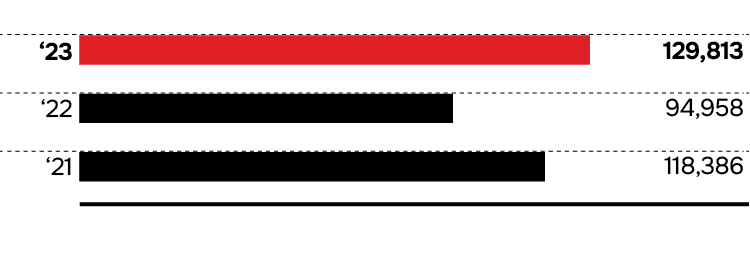
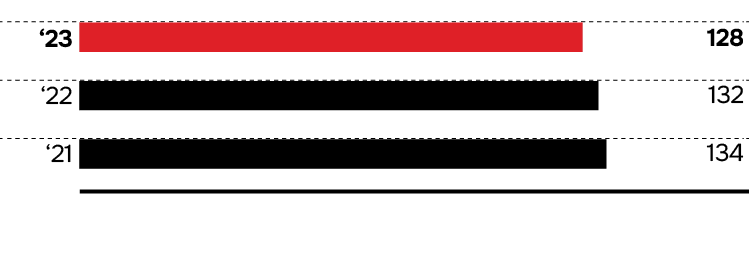
The Agency is planning to assess Scope 2 and Scope 3 emissions of greenhouse gas in 2024.
Responsible Consumption and Waste Management
Waste Management
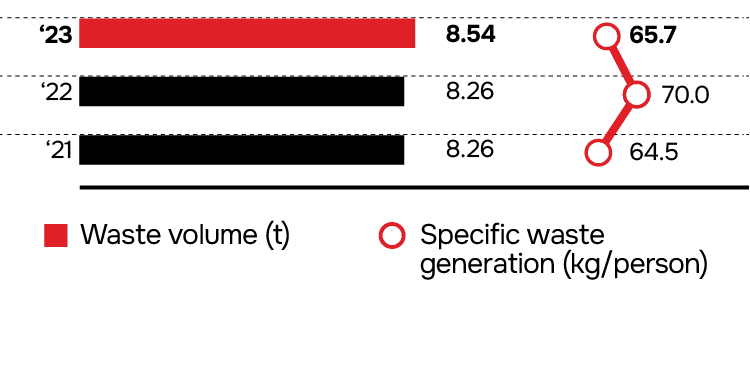
Having no production assets at hand, Expert RA only generates solid municipal waste in the course of its operations. Waste generated in 2023, in non-hazardous classes, totalled 8.54 tonnes. The specific rate of waste generation per employee in 2023 decreased by 6% year-on-year, while the number of employees increased by 10% over the same period. The amount of generated waste depends mainly on the intensity of employees visiting the office (the agency makes good use of remote labour).
The removal and disposal of municipal solid waste is the responsibility of the office building management company and is carried out under a contract with a regional operator. Disposal of decommissioned office equipment is carried out in compliance with environmental laws under an agreement with a specialised recycling company and involves the extraction of useful components. Last time (2021) the Agency disposed 880 kg of decommissioned office equipment.
Water Consumption
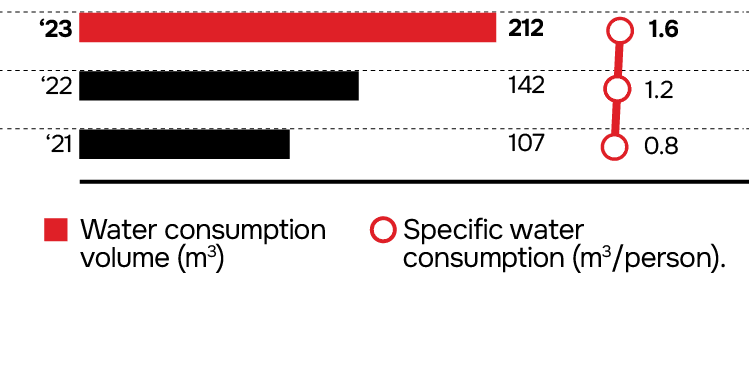
The activities of Expert RA do not have a negative impact on the water resources. The Agency is a responsible water consumer, ensuring water supply and water consumption in line with its agreements with the Moscow City’s authorised services through centralised municipal systems.
In 2023, The water consumption totalled 212 m3, and specific (per employee) water consumption was 1.6 m3/person. The level of water consumption is directly correlated with the frequency of office visits by employees. The increase in water consumption in 2022 and 2023 was due to workers returning to the office to work in a hybrid (office / home) mode after the lifting of COVID-19 restrictions. On the other hand, a significant decrease in water consumption in 2020-2021, was due to the COVID-19 pandemic and shift to remote working. Wastewater treatment to prescribed standards is done at municipal wastewater treatment plants.
Responsible Consumption
The Agency cares about saving natural resources and has undertaken a number of initiatives to reduce resource consumption and waste generation such as:
- Gradual transition to electronic document management has been on since 2018. Today, Expert RA’s internal document flow, including personnel records and rating committee materials, is entirely electronic. This has resulted in a more than a 2-fold decrease (a 56.5% decrease over the past five years) in our paper consumption
- Each workplace now has two monitors installed to avoid printing of work materials and wasting paper
- Employees use water from reusable coolers, installed on each floor, instead of buying single-use plastic bottles
- We choose to use reusable tableware in the office
- We reject printed handouts and research papers at our conferences in favour of electronic versions with QR codes to save consumables, that is, dyes and paper
- When holding conferences, we install eco-boxes for collecting paper and badges to allow them to be recycled
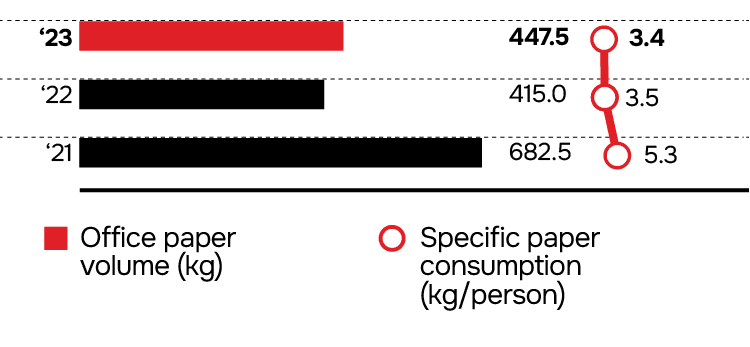
The Agency is committed to creating a comfortable working environment for its employees. One solution in this area is the ongoing office greening programme, which in addition to aesthetical improvement works to shape employs satisfaction and improve indoor air quality. The number of green plants in our office increases annually; year 2023 has seen new 116 plants in workrooms and public spaces, growing at a density of 0.07 plants / m2. To maintain the microclimate in the office space, a centralised air conditioning system with air recovery is used, which allows to save energy costs.
The Agency is planning to adopt goals for responsible consumption and waste handling practices in 2024.
